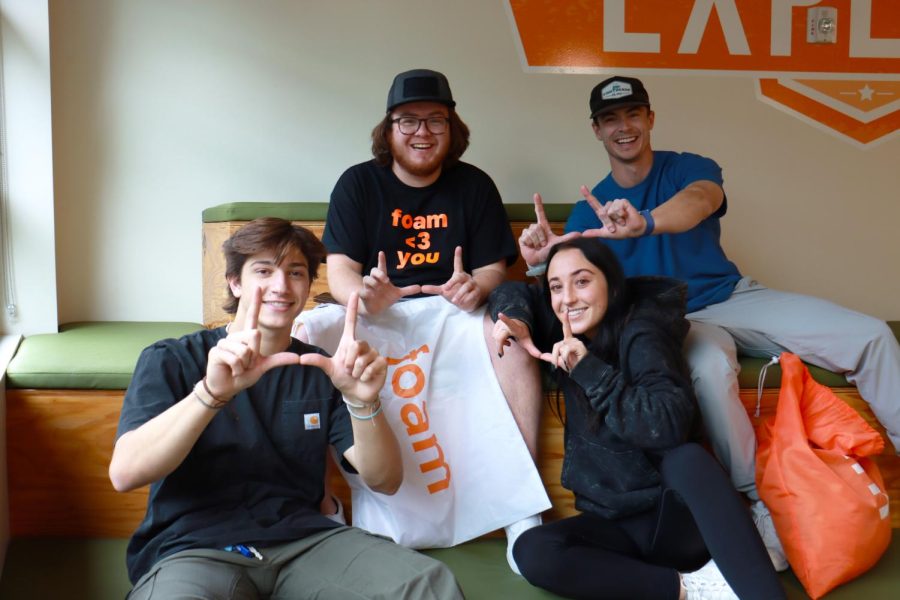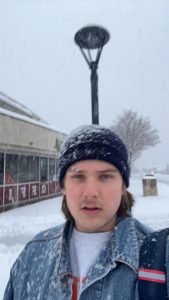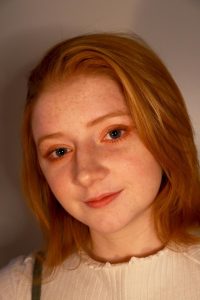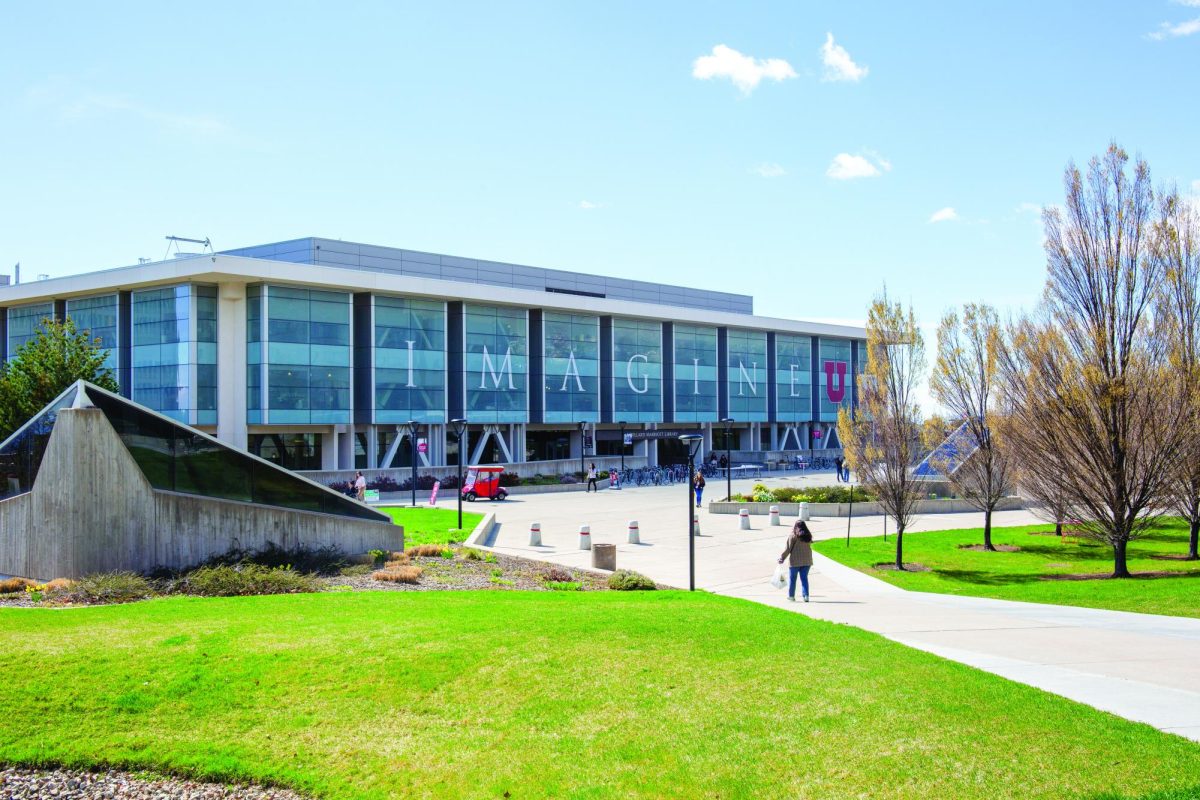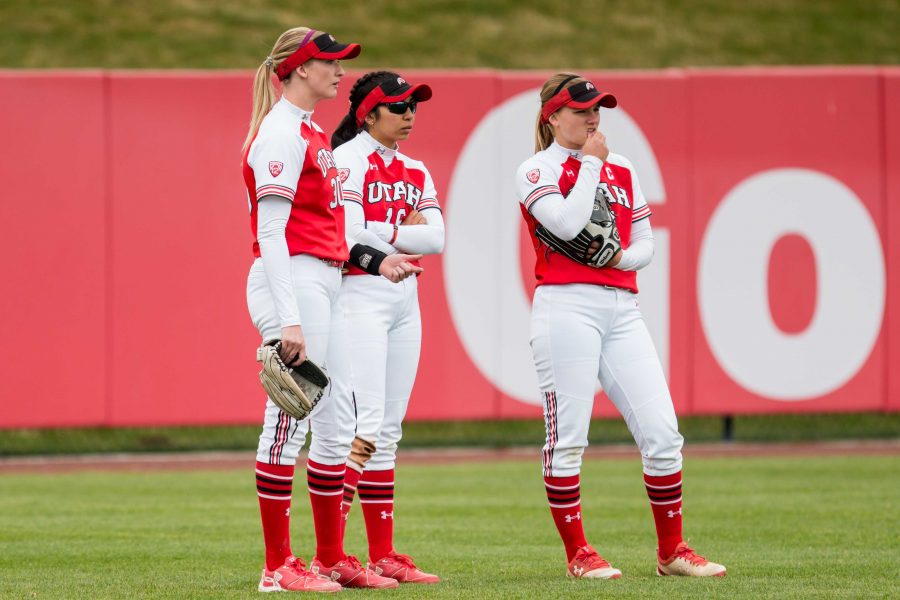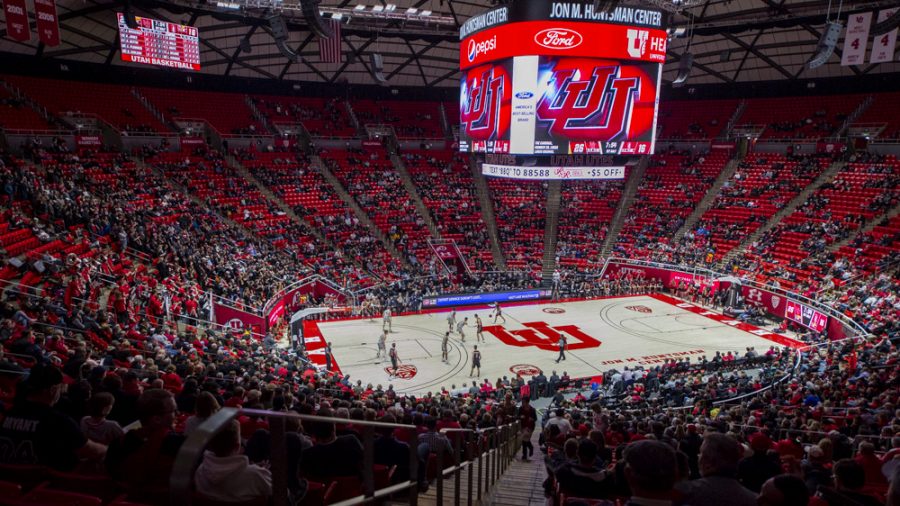How Student-Started Business Foam Became the U’s Premiere Laundry Service
Humzah Khan, Carson Young, Isabel Newell, and Ramsey McCreary flash the U at Lassonde Studios at the University of Utah, Salt Lake City, Utah on Oct. 27, 2022. (Photo by Sarah Karr | The Daily Utah Chronicle)
October 31, 2022
When Carson Young, a fourth-year finance major, was a senior in high school, he came to the University of Utah campus to visit a friend. While there, he saw her pay another friend $10 to do her laundry, and the idea for his company, Foam, was born.
“We call it the innovative direct-to-consumer laundry services for students living on and around college campuses,” Young said of Foam. “Anecdotally, it’s kind of known as the DoorDash for laundry for college kids.”
The idea is simple: for $10 a week, Foam will come to customers’ houses, pick up their laundry and have it returned to them cleaned, dried and folded within 24 hours. In his first year at the U, Young found he hated doing laundry as much as his friend had, and when he was tasked with coming up with a business proposal for an entrepreneurship class, he knew exactly what he wanted to do.
“The idea for what was then called Suds came up, and it was basically the idea of solving the laundry problem,” he said. “But yeah, it started in that class; it was literally a class project.”
After he finished the project, he decided that he wanted to try to make Foam a fully functioning business. He brought on a friend, Kyle Bast, fourth-year information systems and business management major, as his CIO, and they got to work.
“We did a lot of research,” Young said. “We decided we wanted to do a weekly subscription.” They began developing a laundry bag that subscribers could use that would hold approximately 12 pounds of laundry, the amount they found in their research the average person produces in a given week.
Designing this bag proved to be a more significant challenge than they thought, but after completing lots of measurements, they were eventually able to settle on a design. Next, they had to find out if anyone was interested in paying them to do their laundry.
“I think I put it on my like Snapchat and Instagram stories of like, ‘Hey, I’m starting this idea; swipe up if you’re interested,’” Young said. “And we had like 10 kids that were interested in possibly doing this.”
So, once a week for a month, Young and his friends would pick up those students’ laundry and then wash and dry it in the laundry room in the basement of the Marriott Honors Community.
“So, like, at midnight, we would go down there when everyone else would go to bed, and then we’d do all their laundry,” Young said. “Obviously, it’s not like that anymore.”
Now, customers who sign up for the weekly subscription receive one of the branded bags, and if they live off-campus, the Foam crew will come to their house and pick up their laundry. As for students on campus, Foam has partnerships with several of the major dorm buildings, where they have designated drop-off spots and lockers. In addition, they now do the laundry at Young’s house rather than waiting until late at night for the student machines to be available.
“We do laundry about five days a week,” Young said. “But as we speak, we’re actually moving to laundromats, so a couple of different laundromats downtown that are super good.”
According to Young, Foam currently has 25 customers and is increasing its numbers monthly. Though all of this was fairly straightforward to Young, he said starting a business from the ground up is not easy.
“It might not be the best message to hear, but they make it seem super easy to start a business,” he said. “But it’s hard to actually start a business and get one that’s truly working,” he said. He added that because Foam’s business model is so unique, getting it off the ground was even more challenging.
“It’s totally exhausting at some points,” Bast said. Despite this, he added that it is a rewarding experience to start a business as a student.
“Some of the most fun that I’ve had and some of the best memories that I’ve made have been at like two in the morning when Carson just calls me and has something stupid that we need to work on.”
Foam officially launched in the fall of 2021 and brought on a new management team at the start of this semester. Uriel Maldonado, a third-year QAMO major, is the CMO. Ramsey McCreary, a master’s student studying science and finance, is the CFO.
“Those two, combined with some other people that we’ve hired, have made our business go up, I’d say to the next level, almost like an actual proper business,” Young said. “Not just a bunch of students just actually messing around.”
Though they all have their official titles within the company, everyone will work together to get things done.
“We kind of just strategize, see what problems need to be solved, see what we need to work on, and then from there, it’s just hammering out what needs to be done,” Maldonado said.
McCreary echoed that sentiment and emphasized the importance of collaboration within the company.
“A lot of meetings just like talking, collaborating, just kind of throwing ideas around, seeing what everyone likes,” he said. “I feel like it’s always changing what we’re focusing on, what we need to focus on, how we can get better at stuff.”
In addition to the spirit of collaboration, McCreary said he loves foam because of the culture of camaraderie.
“Carson told me at the beginning, ‘my goal is to have a culture of creativity, and everyone can work on everything like there’s no hierarchy,’” he said. “Basically, what he told me the first day until right now, it’s all been the same.”
Looking ahead, Young said he hopes they can expand their customer base into other Utah schools.
“Utah State, Utah Valley, BYU, like, name a school in Utah; we’re hoping to have some form of operations there,” he said. “Basically proving the model outside of just the U.”
In these new operations, Foam would function like a food delivery or rideshare service, where people sign up to wash others’ clothes and get paid.
“That’s the idea — by students, for students,” Young said. “That’s all we’re trying to do at the end of the day.”
He added that while it’s nice to make money, for him, it’s all about helping other kids who hated doing laundry as much as he did during his first year.
“For $10 a week, we’re selling basically one of your days back to you,” he said. “What if you had that time to do something else– to go wakeboarding, to go skiing, to go hang out with your friends, to do more homework, to study harder — whatever it is, we’re selling that back to you.”


